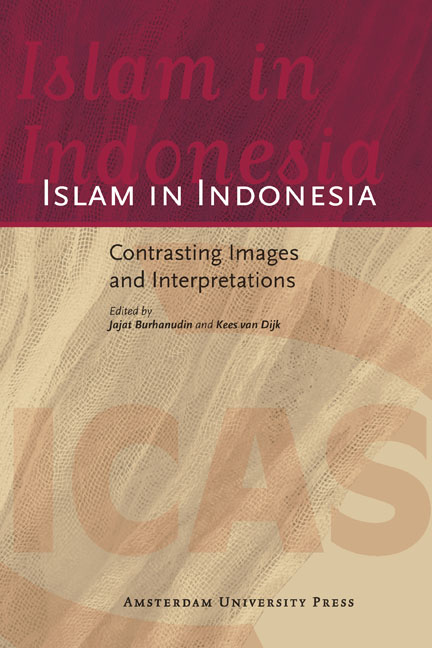Book contents
- Frontmatter
- Contents
- Introduction
- 1 Comparing Different streams of Islam: Wrestling with Words and Definitions
- 2 Defining Indonesian Islam: An Examination of the Construction of the National Islamic Identity of Traditionalist and Modernist Muslims
- 3 Indonesia in the Global Scheme of Islamic Things: Sustaining the Virtuous Circle of Education, Associations and Democracy
- 4 Distinguishing Indonesian Islam: Some Lessons to Learn
- 5 Islam, State and Society in Democratising Indonesia: A Historical Reflection
- 6 The Politics of Piety in the Pondok Pesantren Khusus Waria Al-Fattah Senin-Kamis Yogyakarta: Negotiating the Islamic Religious Embodiment
- 7 The Indonesian Muslim Feminist Reinterpretation of Inheritance
- 8 Managing Familial Issues: Unique Features of Legal Reform in Indonesia
- 9 A new Generation of Feminists within Traditional Islam: An Indonesian Exception
- 10 Religious Pluralism and Contested Religious Authority in Contemporary Indonesian Islam: A. Mustofa Bisri and Emha Ainun Nadjib
- 11 Islam and Humanitarian Affairs: The Middle Class and New Patterns of Social Activism
- 12 Dakwah radio in Surakarta: A Contest for Islamic Identity
- 13 Muslim Fundamentalism in Educational Institutions: A Case Study of Rohani Islam in High Schools in Cirebon
- 14 Majlis Tafsir Al-Qur’an and its Struggle for Islamic Reformism
- Glossary
- About the Editors and Contributors
- Bibliography
- Index
- Monographs
14 - Majlis Tafsir Al-Qur’an and its Struggle for Islamic Reformism
Published online by Cambridge University Press: 09 January 2021
- Frontmatter
- Contents
- Introduction
- 1 Comparing Different streams of Islam: Wrestling with Words and Definitions
- 2 Defining Indonesian Islam: An Examination of the Construction of the National Islamic Identity of Traditionalist and Modernist Muslims
- 3 Indonesia in the Global Scheme of Islamic Things: Sustaining the Virtuous Circle of Education, Associations and Democracy
- 4 Distinguishing Indonesian Islam: Some Lessons to Learn
- 5 Islam, State and Society in Democratising Indonesia: A Historical Reflection
- 6 The Politics of Piety in the Pondok Pesantren Khusus Waria Al-Fattah Senin-Kamis Yogyakarta: Negotiating the Islamic Religious Embodiment
- 7 The Indonesian Muslim Feminist Reinterpretation of Inheritance
- 8 Managing Familial Issues: Unique Features of Legal Reform in Indonesia
- 9 A new Generation of Feminists within Traditional Islam: An Indonesian Exception
- 10 Religious Pluralism and Contested Religious Authority in Contemporary Indonesian Islam: A. Mustofa Bisri and Emha Ainun Nadjib
- 11 Islam and Humanitarian Affairs: The Middle Class and New Patterns of Social Activism
- 12 Dakwah radio in Surakarta: A Contest for Islamic Identity
- 13 Muslim Fundamentalism in Educational Institutions: A Case Study of Rohani Islam in High Schools in Cirebon
- 14 Majlis Tafsir Al-Qur’an and its Struggle for Islamic Reformism
- Glossary
- About the Editors and Contributors
- Bibliography
- Index
- Monographs
Summary
After 1965 Muslims have more and more realised that the Islamisation of Indonesia would in fact mean the Islamisation of Java, and that this was a question of now or never. (Boland 1971: 191)
Besides being wellknown as one of two heartlands of Javanese civilisation and a city with conflicts between ethnic groups and religious adherents where Islam has been highly involved in the struggle for authority among views, perspectives and groups, Surakarta is also renowned as a safe haven for disseminating radical ideologies and a breeding ground for terrorist activities. The historical account of Islamisation in Surakarta takes us to the eighteenth century, when the Javanese court, pesantren and Arab migrant communities played important roles in the Islamisation process (Wildan 2008). The dominant role of the Javanese court gave birth to a mix of Islamic principles and the Hindu-Buddhism tradition, or the so-called abangan tradition as the 1950s American anthropologist, Clifford Geertz, described it. Unlike santri or ‘committed Muslims’ who demonstrate more Islamic orthodoxy, abangan practise Islamic values while continuing to hold animistic values as central to their own well-being (Geertz 1964: 5-7; Boland 1971: 4; Koentjaraningrat 1985: 316-23).
It was in the late nineteenth and the first half of the twentieth century – along with the intensification of communication and contact particularly through the arrival of hajjis, Indonesian students who studied in the Middle East (Laffan 2004: 3-5), and printed media – that Islamic reformist (or modernist for some) ideas emanating from the Middle East started to put the abangan and issues about the relationship between Islam and locality at large into questions pertaining to the truthfulness of Muslim belief (Noer 1973; Liddle 1996: 622-3). Reformism also criticised the existing Islamic practices among traditionalists who were highly influenced by mystical Islam (tasauwuf) and relied too heavily on the scriptural and legal commentaries of previous scholars (taqlid) as codified in Islam jurisprudence schools (madhab) (Hooker 2003: 23; Zulkifli 2003: 111-4; Federspiel 2001: 6). From a theological perspective, Islamic reformism began to emphasise the selfsufficiency of scripture, to call for deliberation pertaining to Islamic legal decisions (’ijtihād), decry what were regarded as unacceptable innovations in matters of worship (bid’a) and suggest that traditionalist ‘ulamā had been too tolerant of popular ritual practices, which were regarded as bid’a or, worse yet, polytheistic deviations (širk) from the true Islam.
- Type
- Chapter
- Information
- Islam in IndonesiaContrasting Images and Interpretations, pp. 227 - 240Publisher: Amsterdam University PressPrint publication year: 2013



